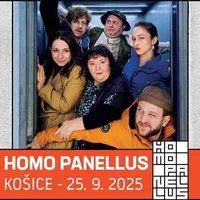
Homo panellus (Panel man)
Comedy
A theatrical comedy about life in a panel housing estate. You never enter the same apartment twice. "I am in every window of this panel building. In this window we play. From this window I watch my neighbors every day. In that one I smoke my last cigarettes after returning from a party. In this one my dinner has just burned down. What is going on in those covered ones? I am made up of all those windows. I am dissolving into all of them. Can you see me?"
Robo would like to finally do something big, but he has something so big in his head that he can't get it out. Mária has returned to her hometown housing estate for a new film. Although teacher Oľga feels very old, her computer is part of something important. Anton, a descendant of nobles, is searching the housing estate for a lost past. Successful doctor Martin is just discovering that he would like to experience something else besides work. Manager Irena is not here yet, because she values her freedom so much that she cannot belong anywhere. And the fragile panels of Petržalka stand firm in a world of crumbling certainties and silently absorb their intertwined stories.
A comedy with elements of true stories from life in the largest panel housing estate in Central Europe, on the border of three states, once divided by the Iron Curtain, on the site of a former village and concentration camp, on the site of the largest inland Danube delta.
The production is created using documentary theatre techniques. It is based on archival research, interviews with historians and theorists, and especially with residents of Petržalka and panel housing estates in the surrounding countries. Like the author's text, the original music by Fer Király and the scenography by Diana Strauszová work with authentic records and found materials. Mass panel construction, which began in the late 1960s, offered standardized housing to millions of people in our countries. Several generations have grown up in panel houses, mostly in housing estates. Standardized panel apartments create an environment for social equality and reflect a certain kind of social utopia. However, the material and their construction are as fragile as this utopia. According to the plans, the panel houses were supposed to bring people a better present and future. Meanwhile, several generations have also lived through the past in them. Will the constructions, just as fragile as the utopia that gave birth to them, carry this past?
Directed by : Ján Simko
Performers: Edita Koprivčević Borsová, Braňo Mosný, Daniela Gudabová, Peter Kadlečík, Eva Mores, Jevgenij Libezňuk
Screenplay: Ján Šimko
Stage and costumes: Diana Strauszová
Music: Fero Király
Video art: Boris Vitázek
Cinematography: Peter Kotrha
